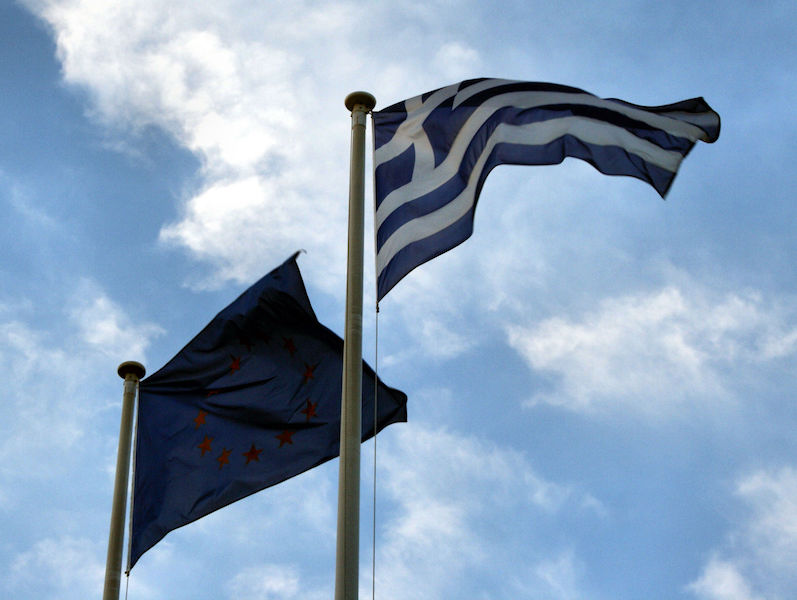Greece’s debt situation first became a problem in 2008, when its budget deficit was revealed to be significantly higher than what the Greek government had claimed in previous years. Now, Greece has become one of Europe’s most troubled economies. With an unemployment rate of almost 25%, poverty threatens many young people in the country, banks are ineffectual, and tax collections have decreased. European governments have become hesitant about Greece’s ability to implement proper economic reforms meant to improve its economy. Three of its previous bailout attempts by international banks and creditors — the EU, International Monetary Fund (IMF), and European Central Bank (ECB), have left a tattered economy, a weak private sector, and inadequate public administration. Debt relief may be Europe’s only viable action to alleviate the crisis and ensure Greece’s economy can prosper within the EU. This idea is supported by the IMF and Greece. Germany however, does not agree with relieving Greece’s debt because it hopes to get back the significant amount of money it has already lent.
Greece makes up only 2% of the entire EU economy, while its population comprises 10 million of the 500 million EU citizens. Its onerous debt already amounts to about €315 billion, or 179% of its economy, and it’s likely that Greece will never be able to pay it back. A lengthy recession and prolonged austerity are to blame for the government’s chronic overspending and the level of crisis facing the country.
Greece runs a severe risk of defaulting on the €7 billion debt repayment it is expected to make this July. Consequently, a tentative deal has been reached between Greece and its lenders to receive emergency funds as a bailout package. While this is meant to avoid Greece defaulting, declaring bankruptcy, and leaving the Euro currency zone, it will come at the expense of even more pension cuts from working class Greeks.
Germany has contributed €180 billion to bailing out Greece — the most of any single country, and it has made requests to the IMF to assist in financing Greece’s debt in the future. By its own rules however, the IMF is not permitted to provide any bailout or loan that would leave the receiving country with an unsustainable burden of debt. In this case, the IMF does not share the same economic forecasts of Greece as its European commission does. Greece must first receive debt relief from its European neighbours if the IMF is to help fund Greece’s next bailout package. However, Germany is reluctant to agree to the IMF’s terms because of the ramifications it would bring, most notably for German Chancellor Angela Merkel. If the billions of Euros’ worth of German taxpayer money given to Greece in previous bailout packages was forgiven, the federal election scheduled for September in Germany may have opposition political parties leading the polls. This is something the current German government is wary of, making them sceptical of adhering to the IMF’s demands.
The alternative option to debt relief is Grexit. After years of living through a suffering economy, the possibility of Greece leaving the EU is always looming. With continuous debt repayments and strict fiscal policies controlled by the EU, Greece is experiencing the restrictions of its monetary union. There is speculation that Greece’s economy will not survive in the Eurozone in the long term. However, if Grexit became a reality, it is likely to send Greece into severe poverty and hyperinflation, creating a crisis similar to what is happening in Venezuela today. Grexit would restore Greece’s competitiveness internationally, but would significantly devalue the Euro. Hence, the efforts by creditors to keep Greece afloat. A second country leaving the EU would also negatively affect the identity of the EU and its approach to collective action and could make potential EU members reluctant to pursue membership.
While another bailout package would enable Greece to make its next debt payment in July, it raises questions of how Greece would move forward considering its history of bailout attempts. Even if initial economic reforms are effectively implemented now, Greece’s debt is still forecasted to drop from 179% to 160% by 2030 — a significant amount of time for such a minor change. The IMF further predicts that under these current reforms, Greece’s debt will be 275% of its economy by the year 2060. Greece’s present programme for reform is thus unsustainable, and the country requires one clearly set out for the medium term. This means that, on top of Greece receiving a significant portion of debt relief, all political parties in Greece should adopt economic measures. This will hopefully foster more confidence in Greece’s political atmosphere, despite the waning popularity of the current Greek government.
Regardless of the outcome of Greece’s next bailout, the crisis will still continue, leaving Europe with its hands full. Under surges of national populism; an upcoming Brexit departure; and other lagging economies like Spain, Portugal, and Italy, Grexit remains a mere possibility for the EU and ECB for now. However, that could change in a few months or years. The EU will not be able to sustain bailouts for Greece over the long term, and tough decisions will eventually have to be made about Greece’s future within the EU.
Photo: Greek and EU flags (2013), by Mick Baker via Flickr. Licensed under CC BY-ND 2.0.
Disclaimer: Any views or opinions expressed in articles are solely those of the authors and do not necessarily represent the views of the NATO Association of Canada.




